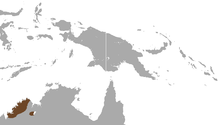Scaly-tailed possum
| Scaly-tailed possum[1] | |
|---|---|
| Scientific classification | |
| Kingdom: | Animalia |
| Phylum: | Chordata |
| Class: | Mammalia |
| Infraclass: | Marsupialia |
| Order: | Diprotodontia |
| Family: | Phalangeridae |
| Genus: | Wyulda Alexander, 1918 |
| Species: | W. squamicaudata |
| Binomial name | |
| Wyulda squamicaudata Alexander, 1918 | |
 | |
| Scaly-tailed possum range | |
The scaly-tailed possum or the Ilangnalya (Wyulda squamicaudata) is found in northwestern Australia. It is restricted to the Kimberley region in Western Australia.[3] As it is monotypic in its genus, it is sometimes known simply by its genus — the Wyulda.
The scaly-tailed possum is a member of the family Phalangeridae, which means that it is related to cuscuses and brushtail possums. It is a solitary nocturnal forager that feeds on leaves, flowers and fruit.[3]
As its name implies, its distinguishing feature is a hairless, scaly tail.
The possum has a limited range and is found in high rainfall coastal regions of the north Kimberley between Yampi Sound and Kalumburu, as well as further inland in the east Kimberley at Emma Gorge.[4][5] Populations also inhabit Bigge Island and Boongaree Island. The preferred habitat of this animal is sandstone based woodlands where it can shelter in rock piles and fissures and feed in the trees.[6]
References
- ↑ Groves, C.P. (2005). Wilson, D.E.; Reeder, D.M., eds. Mammal Species of the World: A Taxonomic and Geographic Reference (3rd ed.). Baltimore: Johns Hopkins University Press. p. 50. ISBN 0-801-88221-4. OCLC 62265494.
- ↑ McKnight, M. (2008). "Wyulda squamicaudata". IUCN Red List of Threatened Species. Version 2008. International Union for Conservation of Nature. Retrieved 28 December 2008. Database entry includes justification for why this species is data deficient
- 1 2 Menkhorst, Peter (2001). A Field Guide to the Mammals of Australia. Oxford University Press. p. 84.
- ↑ Doody, Sean J.; David Rhind C; Christina M. Castellano B & Michael Bass (2012). "Rediscovery of the scaly-tailed possum (Wyulda squamicaudata) in the eastern Kimberley". Australian Mammalogy. 34 (2): 260–262. doi:10.1071/AM11039.
- ↑ Potter, Sally; Dan Rosauer; J. Sean Doody; Myfanwy J. Webb; Mark D. B. Eldridge (2014). "Persistence of a potentially rare mammalian genus (Wyulda) provides evidence for areas of evolutionary refugia within the Kimberley, Australia". Conservation Genetics. doi:10.1007/s10592-014-0601-4. Retrieved 22 April 2014.
- ↑ "Action Plan for Australian Marsupials and Monotremes". 1996. Retrieved 2009-03-11.
